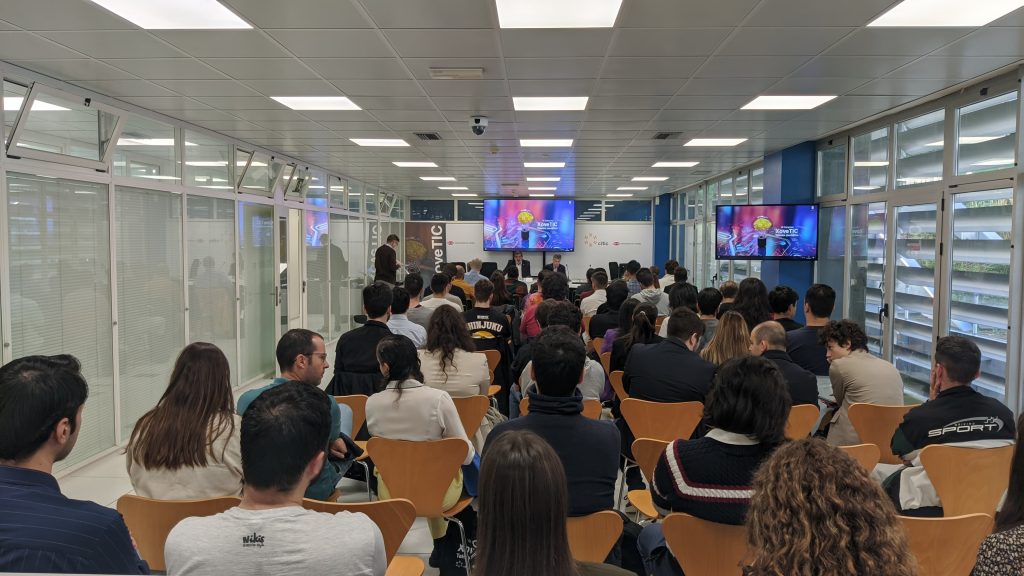
The VII XoveTIC Congress brings together 120 young researchers in an event where 74 papers are presented in the most innovative areas of ICT.
- The Congress is being held on October 17 and 18 at the CITIC and the Faculty of Computer Science at the University of A Coruña
- Alejandro Rodríguez from RC Deportivo opened the event with a plenary session on the use of ICT in sports
- Throughout these two days, research will be presented on topics such as artificial intelligence, language models, virtual reality, and cybersecurity, among others
A Coruña, October 17, 2024.- The Research Center for Information and Communication Technologies (CITIC) at the University of A Coruña kicked off the seventh edition of the XoveTIC Congress this morning, which will take place this Thursday and Friday in A Coruña. This edition brings together more than 120 young researchers over two days, during which 74 scientific papers will be presented in the most innovative areas of Information and Communication Technologies. The congress serves as a benchmark for promoting new talent in the scientific field, offering participants a space for debate and training through oral presentations and posters.
During the opening session, the rector of the University of A Coruña, Ricardo Cao Abad, emphasized the importance of this event for the emerging scientific community:
“The XoveTIC Congress is a unique opportunity for young researchers to showcase their advances and connect with other professionals in the field. This is where many collaborations that will drive the future of research in disruptive technologies are formed.”
The rector also highlighted the significance of the Faculty of Computer Science as a source of research personnel for CITIC and encouraged the young attendees to explore one of the existing research lines, industrial doctorates, which aim to solve specific problems faced by companies through technological and scientific innovation.
Meanwhile, the director of CITIC, Manuel G. Penedo, underscored the center’s commitment to innovation and the training of new talent: “Our goal is to provide young researchers with the tools and environment necessary to conduct excellent research. CITIC continues to invest in emerging talent and projects that have a direct impact on society.”
After the inaugural session, Alejandro Rodríguez, a representative from RC Deportivo, delivered a plenary session discussing the application of ICT in professional sports and the technological challenges in data management in football.
Sports, virtual reality, language, and health
Throughout the day, several oral presentations were made addressing current and relevant topics in the field of Information and Communication Technologies. Participants delved into studies such as “Transfer Learning in Action Detection in Football Across Different Domains,” which focused on how action detection techniques applied in football can be adapted and transferred to other contexts, exploring the possibilities that artificial intelligence offers to enhance sports performance.
Another presentation discussed “Ethical and Deontological Principles in Managing Military Stress Through Virtual Reality.” This study analyzed the ethical and deontological challenges that arise in training aimed at managing stress in the military context, using immersive virtual reality environments.
Additionally, an application for tablets was presented, designed to work on routines and emotions for individuals with Autism Spectrum Disorder (ASD). This work highlighted an application aimed at improving humor, understanding feelings, and managing daily routines in individuals with ASD through interactive games.
Furthermore, advancements in the development of Cabuxa were showcased, an AI-based language model that addresses the challenge of processing texts in underrepresented languages, emphasizing its utility for the preservation and promotion of these languages.
Health care was another thematic focus of the presentations, including a study on the “Use of Machine Learning to Combat Toxicity in Online Health Conversations.” This research explored how machine learning algorithms can be employed to detect and reduce toxicity in forums and digital platforms discussing health topics, aiming to create safer environments for users.
Closing and Awards
The XoveTIC Congress will conclude on October 18 with another day of scientific presentations and the awards ceremony for the best works, selected by a scientific committee that will evaluate the quality and originality of the submitted research.
For more information about the complete program of the congress, please visit the official website: https://xovetic.citic.udc.es.





